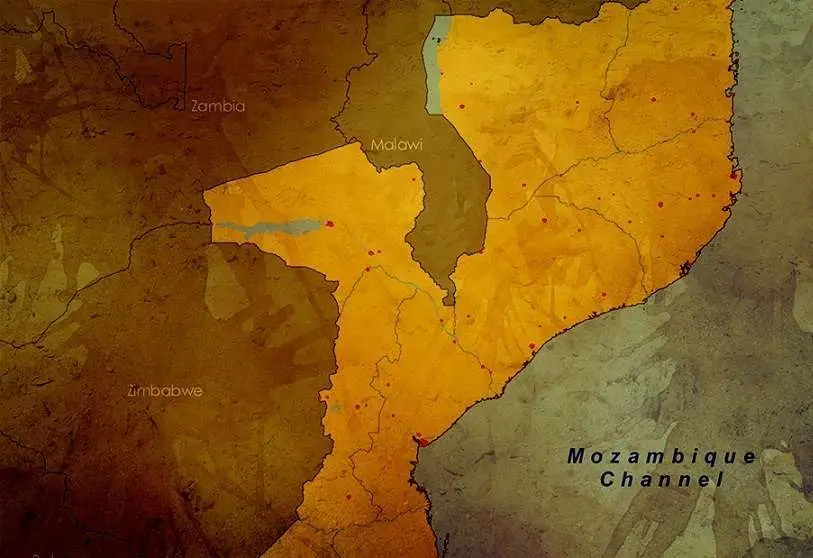Attacks in northern Mozambique intensify

Since the beginning of the year, they have not stopped moving forward and gaining ground. These days, a video is circulating on social networks where some young militiamen claim to be in the Macomia district, about a hundred kilometres from Pemba, the provincial capital; much closer than previously thought.
The claim could not be verified, but the truth is that, for now, they seem unstoppable in their march. This is the Islamist group that operates in the province of Cabo Delgado, in the north of Mozambique.
Ahlu Sunnah wa Jammah, as they call themselves, began as an Islamist sect in 2014 and, in 2017, they had their first skirmish with the police when they attacked a post in Mocimboa da Praia. Since then, they have acted intermittently, but in recent months they seem to have returned with strength and determination.
Although there is no official confirmation, some analysts believe that the group is affiliated with Daesh through its Central African Province (ISCAP). Satellite photos taken after the attack on Quissanga on March 25 show masked men in combat uniforms next to Daesh's black flag. The organisation also released a video stating that the Mozambican army had withdrawn from Muidumbe after fierce fighting with its forces.
They have since re-entered Mocimboa da Praia in what has been the group's largest operation to date with a combined land and sea attack that destroyed many of the barges used to deliver materials used in the construction of the gas exploitation facilities discovered in the region. The last recorded incursion was on Sunday 12 April and took place on the island of Ibo in the Kurimbas archipelago.
Some observers say the insurgents are using the same tactics used by Renamo, the guerrilla group and subsequently the opposition party, in the 1980s: encircling villages while cutting off power lines and water supplies in rural areas, which are more difficult to monitor, but leaving the big cities out of their tactics.
There are concerns that there are indications that some of the security forces are supporting the insurgents. According to social networks, the attack on Mocimboa de Praia was led by Daitão Jamal Tevula, a former Marine officer who allegedly recently defected to join the insurgents.
Another fear is that the terrorists would be gaining the support of the local population as they lose faith in the Government and the security forces. And they are working hard to do so: after the second capture of Mocimboa da Praia, the insurgents looted banks and shops and handed over money and food to the residents, many of whom cheered them on, several local reports indicate. These sources also say that when the army retook the town the next day, several civilians were beaten in retaliation for their support of the rebels.
From the outset, the Mozambican government opted for force to suppress the rebellion: hundreds of people have been arrested and some mosques have been closed and some even destroyed. It is suggested that mercenaries have been hired to support the army in its duties. War veterans have also reportedly organised themselves to fight the Islamists.
The members of Ahlu Sunnah wa Jammah are primarily marginalised young people with virtually no education and unemployed. They have been joined by young migrants seeking an opportunity in life and educated religious leaders outside the country, especially in Saudi Arabia and other Gulf countries. Experts indicate that the emergence of this group is very similar to that of Boko Haram in northern Nigeria. It started as a religious sect and then transformed into an armed group. Like Islamists in the West, Mozambicans aim to impose Sharia, or Islamic law, hence their constant attack on any symbol of government presence (such as schools, the health system or the law), but have yet to make any known political claims.
The doubt raised by this group is that its emergence practically coincides with the discovery of large oil and gas reserves in the region.
As in so many other conflicts, economic, religious and security issues are behind the emergence of this group. Cabo Delgado province has 2.3 million people, 58 per cent of whom are Muslims. In the last decade, huge deposits of oil and gas have been discovered there, which are exploited by foreign companies and leave little profit in the area. A large part of its population lives in poverty and young people complain about the lack of opportunities.
It is these causes that are at the root of this insurgency that must be attacked alongside or even before the military response. As in other parts of Africa, this only leads to the local population turning to the insurgents, which does not help to end the conflict.








